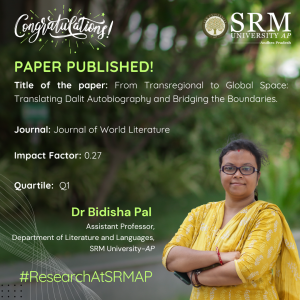 Translation often serves as a vital bridge between languages and cultures and Translators are often poised as “gatekeepers” who preserve the authenticity and richness of a text. Dr Bidisha Pal, Assistant Professor at the Department of Literature and Languages in her research paper, “From Transregional to Global Space: Translating Dalit Autobiography and Bridging the Boundaries” speaks of the power of translation in safeguarding and raising awareness of caste. Her work also illustrates how translation smoothens the divide between language and enables the voice of the marginalised to be heard.
Translation often serves as a vital bridge between languages and cultures and Translators are often poised as “gatekeepers” who preserve the authenticity and richness of a text. Dr Bidisha Pal, Assistant Professor at the Department of Literature and Languages in her research paper, “From Transregional to Global Space: Translating Dalit Autobiography and Bridging the Boundaries” speaks of the power of translation in safeguarding and raising awareness of caste. Her work also illustrates how translation smoothens the divide between language and enables the voice of the marginalised to be heard.
Abstract:
The present research brings forward some standpoints. First, the translation of Dalit autobiographies creates transnational solidarity. Second, the translators play the role of gatekeepers to show that translation sustains the literary and cultural essence ingrained within the texts and initiates and engages dialogic discussions among the audience and readers on the global platform. Third, the translation of Dalit autobiographies arrests the attention of those global readers who barely nurture any idea on caste, class, and casteist politics and deep-rooted issues like untouchability in India and constructs a distinct literary geography.
Explanation in layperson’s terms:
The research deals with the idea of literary translation and its necessity. These two autobiographies are written in regional Bengal. When translated, the boundary of regions gets dissolved, and the essence of the texts reach the global arena. Besides, translation also acts as the bridge to the outer world. However, oftentimes the act of translation is not an innocent act anymore; rather it interferes with the original meaning to transcreate.
Practical/ Social Implications:
The research talks about translation and its necessity to bridge boundaries. The texts that the article focuses on are from the people of the marginalized communities of Bengal who write to voice their concerns and who feature in a considerable period of history that should be known to people. Since, linguistic regionalism is the main constraint for the literary texts, translation provides the desired space and opportunity to help them reach the global platforms and their history and literature become part of the larger repertoire of World Literature.
The link to the article:

